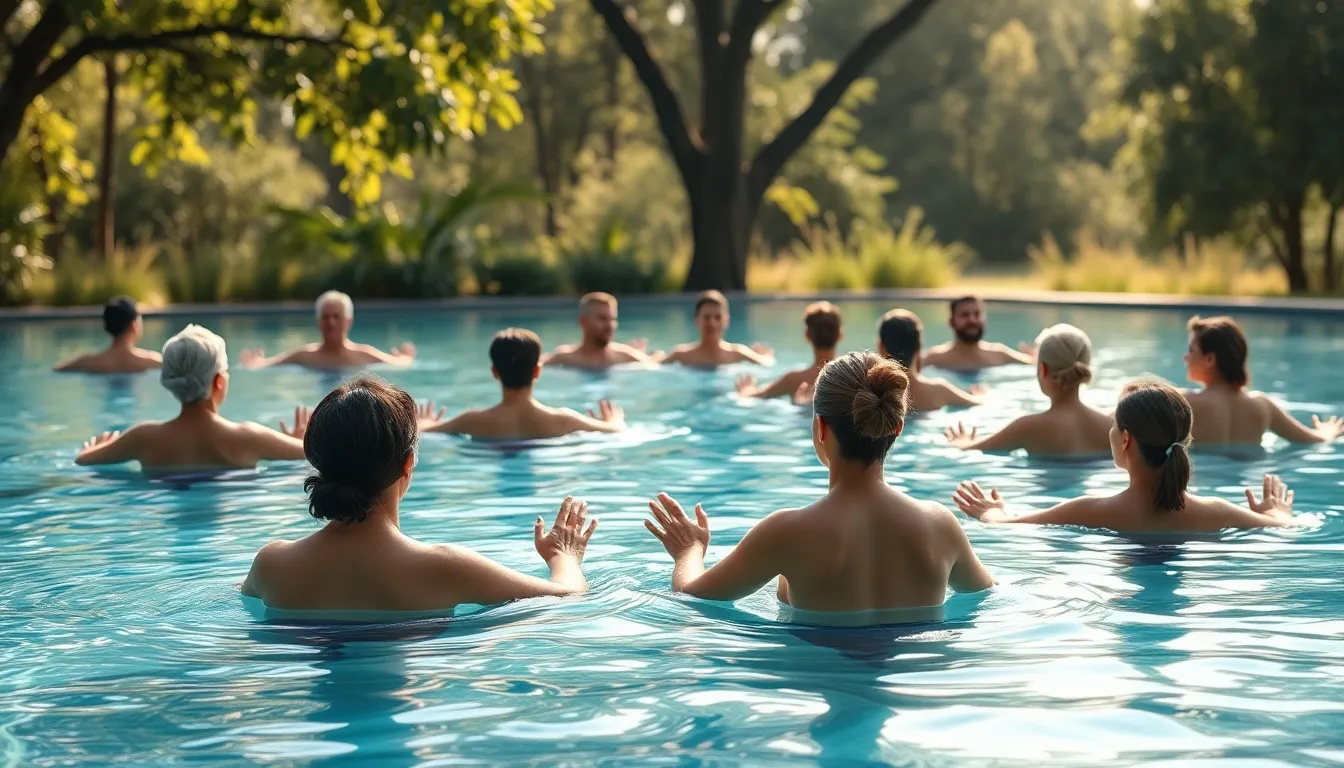In a world where stress levels can rival a cat in a room full of rocking chairs, finding tranquility is crucial. Enter mindful water therapy, the delightful blend of relaxation and rejuvenation that’ll have you feeling like a mermaid (or merman) in no time. Imagine soaking in warm water while your worries float away—sounds dreamy, right?
This innovative approach combines the soothing properties of water with mindfulness techniques, creating a serene escape from daily chaos. It’s not just about splashing around; it’s about diving deep into self-awareness and healing. So grab your floaties and get ready to explore how mindful water therapy can transform your mental and physical well-being. After all, who wouldn’t want to make waves in their self-care routine?
Table of Contents
ToggleWhat Is Mindful Water Therapy?
Mindful water therapy combines the soothing properties of water with mindfulness techniques. Practitioners engage in activities like water meditation or hydrotherapy, focusing on the sensations created by water. This practice fosters relaxation and promotes mental clarity.
Participants often find that immersing themselves in water helps alleviate stress. Exploring various elements, such as the temperature and movement of water, enhances the experience. Mindful water therapy encourages individuals to notice their surroundings and tune into their thoughts and emotions.
Studies indicate that interacting with water can improve mood and decrease anxiety levels. Mindful water therapy often incorporates techniques like deep breathing and visualization, which increase its effectiveness. Individuals can practice this therapy in settings ranging from pools to natural water bodies, allowing for a versatile approach.
The effectiveness of mindful water therapy is evident as it promotes a holistic approach to well-being. Whether through guided sessions or individual practice, people report significant improvements in their emotional and physical health. Adopting this therapeutic method can lead to deeper self-awareness and personal growth.
Benefits of Mindful Water Therapy

Mindful water therapy offers numerous benefits that enhance both physical and mental health. Practitioners often experience improvements in overall well-being.
Physical Health Benefits
Engaging in mindful water therapy promotes better circulation by encouraging increased blood flow. Immersion in warm water relaxes muscles, reducing tension and fatigue. Water’s buoyancy eases pressure on joints, making it easier for individuals with chronic pain to move freely. This therapy can enhance flexibility through gentle stretching exercises performed in water. Additionally, warmth and movement stimulate the immune system, leading to improved health outcomes.
Mental Health Benefits
Mindful water therapy significantly reduces stress levels while promoting relaxation. Focusing on the sensations of water encourages practitioners to embrace the present moment. Enhanced mood and reduced anxiety stem from the calming effects of water. Engaging in deep breathing during water activities further boosts mental clarity, providing emotional stability. Studies indicate that individuals practicing water meditation report heightened self-awareness and personal growth, contributing to overall mental well-being.
Techniques Used in Mindful Water Therapy
Mindful water therapy employs several techniques to enhance relaxation and self-awareness through water interaction. Two key methods include breathing exercises and visualization practices.
Breathing Exercises
Breathing exercises form a core aspect of mindful water therapy. Practitioners use deep, rhythmic breathing to promote relaxation. Focusing on inhaling and exhaling helps center the mind. This technique reduces stress and encourages present-moment awareness. Engaging the breath while immersed in water amplifies the calming sensations of the environment. Often, individuals practice counts, inhaling for four counts and exhaling for six. Such patterns facilitate deeper relaxation, fostering mental clarity and emotional stability.
Visualization Practices
Visualization practices play a significant role in mindful water therapy. Participants envision serene water settings, such as calm lakes or gentle streams. This mental imagery creates a safe space for emotional release. Many visualize feelings of stress dissolving away with each wave. Imagining the warmth of sunlight reflecting on water can enhance feelings of peace. By incorporating this technique, individuals deepen their mindfulness experience, resulting in increased self-awareness. Practicing visualization alongside water immersion further amplifies therapeutic benefits.
Integrating Mindful Water Therapy Into Daily Life
Incorporating mindful water therapy into daily routines enhances overall well-being. Practitioners benefit from simple yet effective methods at home or in group settings.
Home Practices
Creating a mindful water therapy practice at home offers flexibility and comfort. Individuals can start by filling a bathtub with warm water for relaxation. Using essential oils like lavender can further elevate the experience. Next, practitioners can engage in breathing exercises while focusing on the sensations of water. Adding calming music or nature sounds helps enhance concentration. Water meditation can take place while soaking in the tub or even in a shower, as attention shifts to the sound of water. Incorporating visualization techniques also deepens the practice, allowing individuals to imagine themselves in serene waterfront scenes. Taking just 15-30 minutes a few times a week can yield significant mental benefits.
Group Sessions
Group settings provide a collaborative environment for mindful water therapy. Participants can gather at local pools or natural bodies of water, fostering a sense of community. Within these sessions, a trained facilitator can guide individuals through structured practices. Activities often include synchronized breathing exercises in water, promoting connection and group cohesion. Participants might also practice water meditation while floating together, creating a deep sense of calm. Sharing experiences with others after sessions often leads to valuable insights and support. Regular attendance at group sessions amplifies benefits, offering motivation and encouragement along the journey to enhanced well-being.
Mindful water therapy offers a powerful way to enhance overall well-being by merging the calming effects of water with mindfulness practices. This innovative approach not only alleviates stress but also fosters deeper self-awareness and emotional stability. By incorporating techniques like deep breathing and visualization, individuals can unlock the full potential of their experiences in water.
Whether practiced alone or in a group setting, mindful water therapy encourages a holistic approach to self-care. As more people discover its benefits, this unique method can become an essential part of their routines, leading to significant improvements in mental and physical health. Embracing mindful water therapy may just be the key to achieving a more balanced and fulfilling life.
